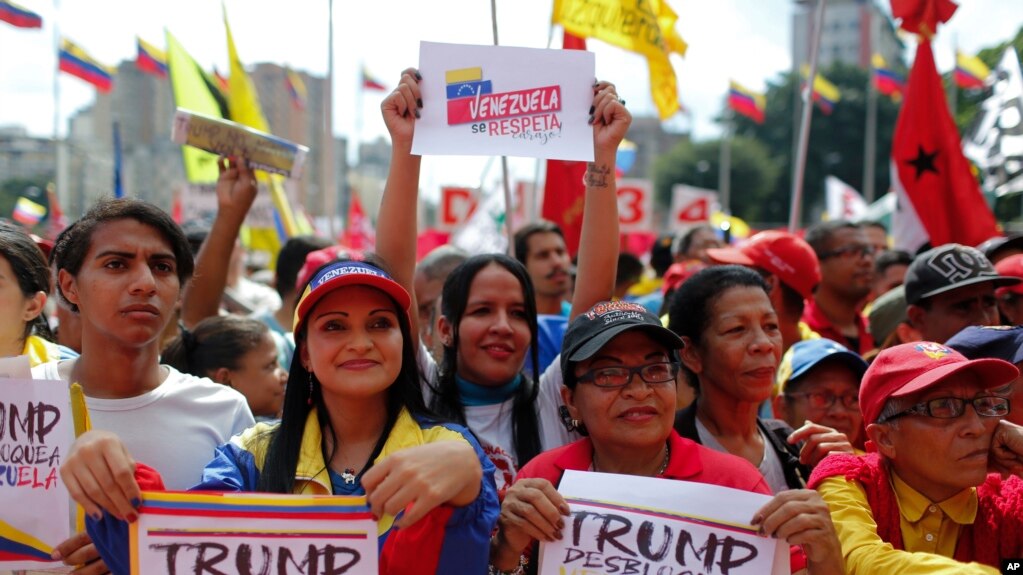By Tim Young
Early signs of what the incoming Trump administration in the US has in store for Venezuela were revealed in mid-November with the approval by the House of Representatives of a new Bill tightening the existing blockade against Venezuela.
The Bill, which still requires Senate approval, is entitled Banning Operations and Leases with the Illegitimate Venezuelan Authoritarian Regime Act, known by its deliberately offensive acronym, the Bolivar Act.
The Bill was introduced by two representatives from Florida — Democrat Debbie Wasserman Schultz and Republican Mike Waltz, nominated as Trump’s national security adviser, who has said that the Bill “sends a powerful message to Maduro that there will be no appeasement.”
It is also endorsed by Florida senators Marco Rubio and Rick Scott, who supported an earlier version in 2021. Rubio, picked by Trump as the next head of the State Department, has long been a fanatical hawk for tougher sanctions against Venezuela to achieve the long-held US objective of “regime change.”
The new Act aims to convert into legislative norms the executive orders that have underpinned US policy of applying illegal coercive sanctions against Venezuela over the past 10 years. This will limit the US executive branch’s ability to temper or eliminate sanctions in the future.
The Act also expands the scope of sanctions by employing a wide definition of those at risk of penalty, covering individuals, private entities, governmental bodies and their extensions. This is aimed not just at US domestic targets but those anywhere in the world who might or currently trade with Venezuela.
Under the first Trump administration, the initial wave of sanctions introduced by Barack Obama was ramped up into a series of increasingly severe measures against individual government members and the country as a whole, despite this being illegal under US and international law and treaties that the US has signed.
Starting in 2017, Trump barred the Venezuelan government from borrowing from financial markets, blocked assets, and prohibited US businesses from dealing with Venezuela’s oil company, PDVSA, the state’s largest source of revenue.
The disruption to Venezuela’s reliance on oil exports, by cutting PDVSA off from international markets and blocking it from servicing debt, cost Venezuela billions of dollars in revenue.
Under threat, too, foreign companies started pulling out, disrupting supplies of essential goods. Foreign banks became reluctant to handle transactions involving Venezuela.
Estimates put the resulting catastrophic drop in Venezuela’s Gross Domestic Product —in terms of what the economy stopped producing between 2015 and 2022— as equivalent to $ 642 billion, with predictable results for Venezuelans, especially the poor, elderly and infirm.
The overall effect was summed up in 2021 by Alena Douhan, UN Special Rapporteur on universal coercive measures, thus: “Sanctions have prevented revenues and the use of resources to develop infrastructure and carry out social support programs; they have had a devastating effect on the entire population of Venezuela and have undermined the very foundation of social life and the enjoyment of human rights.”
Food and medicine have been targeted by sanctions. The blocking of financial transfer meant Venezuela was unable to access vaccine supplies, leading to vaccination coverage for several diseases falling, with predictable results.
In the case of food, in January 2017, for example, several international financial institutions refused to process of payment transactions, made by the government worth $297 million, to implement the National Seed Plan, seriously affecting the country’s food production.
The obstruction of food imports continued. The US financial system directly blocked the transfer to Venezuela of 18 million boxes of subsidised food for the Local Supply and Production Committees (CLAP) programme in September 2017.
The extraterritorial impact of the US’s sanctions regime induced the Swiss bank Hyposwiss to close the account of the company shipping 90 thousand tons of soybean cake worth 15.9 million euros to Venezuela in October 2018. The same month, the Colombian government blocked the shipment to Venezuela of 400 thousand kilos of food destined for the CLAP programme.
An early report on the effect of US sanctions by the Center for Economic and Policy Research (CEPR) in 2019 estimated that they had caused more than 40,000 deaths from 2017 to 2018, by depriving Venezuelans of lifesaving medicines, medical equipment, food and other essential imports.
As Trump ramped up the sanctions programme into a blockade akin to that imposed against Cuba since the 1960s, the poor and most vulnerable continued to suffer the most harm, while over seven million Venezuelans were forced as economic migrants to leave the country.
It has taken nearly a decade of sustained effort to bring about recovery in Venezuela’s economy. On the trading front, this has involved Venezuela engaging with BRICS members to mitigate the impact of sanctions and diversify its commercial options.
Recognising this, the new misnamed Bolivar Act aims to significantly expand the extraterritorial reach of the US’s secondary sanctions in an attempt to further choke Venezuela’s economy and disrupt its trade dynamics. Regime change is still the US’s objective, no matter what the cost to ordinary Venezuelans.
As a major online event this week showed, the solidarity movement in Britain must be prepared to defend Venezuela’s right to self-determination against US interference in its affairs, including any renewed offensive of economic aggression by Trump when he assumes the presidency in 2025.

